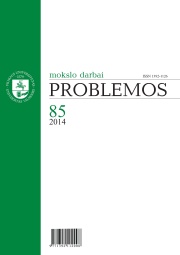SĄVOKOS CHŌRA PERMĄSTYMAS DERRIDA FILOSOFIJOJE: TIKĖJIMO BE ONTOTEOLOGIJOS DOMINAVIMO GALIMYBĖ
RETHINKING THE NOTION OF CHŌRA IN DERRIDA’S PHILOSOPHY: THE POSSIBILITY OF FAITH WITHOUT DOMINATION OF ONTOTHEOLOGY
Author(s): Ieva RudžianskaitėSubject(s): Philosophy
Published by: Vilniaus Universiteto Leidykla
Keywords: chōra; apophatic discourse; ontotheology; faith; unknowing.
Summary/Abstract: The article deals with Derrida’s interpretation of the platonic notion of chōra. Considering this term, Derrida questions the ontotheological image of Deity and its influence on the religious sphere which is inseparable from knowledge. First of all, the notion of chōra, which could be described as a ‘foreign body’ in the logocentric tradition, is overviewed. Further, negative expressions of the language – hyperousiological and choral are analyzed, showing that in Plato’s Timaeus the possibility of two forms of apophatic discourse has appeared. The analysis reveals that the structure of hyperousiological discourse expresses the ontotheological hierarchical order whereas the choral form is in relation to the possibility of multiplicities of modes and de-centration of discourses. The results of this investigation show that the role of faith in these negative forms is perceived very differently. The Deity is described as a ‘Being beyond being’ in the hyperousiological form, whereas choral discourse has no cognitive content of faith. On the other hand, faith as such is undeniable, even if it is closely connected to atheism as doubt. In this way, the interplay between faith and atheism appears as a moment of unknowing, which is inseparable from the concept of chōra.
Journal: Problemos
- Issue Year: 2014
- Issue No: 85
- Page Range: 118-129
- Page Count: 12
- Language: Lithuanian

